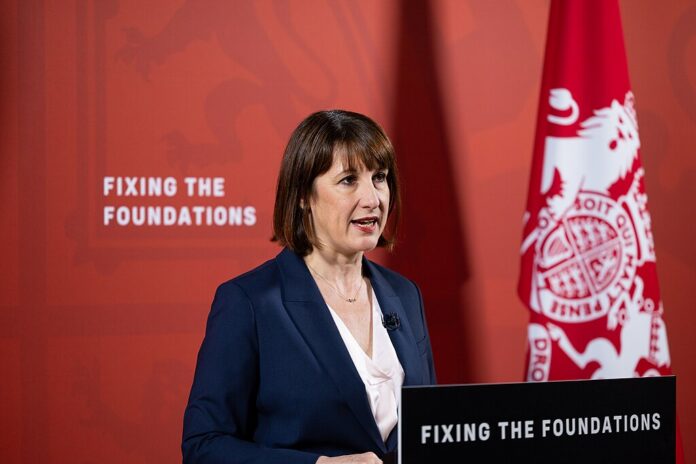Potential new national insurance charges on pension contributions could raise billions, prompting concerns about Labour’s commitment to protecting pensioners
As the Labour government prepares for its upcoming budget announcement, speculation mounts around potential changes to pension regulations that could significantly impact workers’ retirement funds. Political correspondent Anna Gross from the Financial Times has raised alarms about the possibility of introducing National Insurance charges on employers’ pension contributions. This move could effectively eliminate the current exemption and generate an estimated £23 billion for the Treasury, a figure that has drawn both concern and scrutiny.
In a recent interview with GB News, Gross stated, “I think it’s definitely an option that’s on the table, and it’s something that her team have looked at.” While she emphasized that it remains uncertain whether this will be the final decision, she noted that the government is exploring various avenues to address the pressing fiscal situation, including potentially aligning capital gains tax more closely with income tax.
Rachel Reeves, the Chancellor, faces significant pressure as she seeks to navigate a fiscal landscape that includes a projected £22 billion black hole in public finances. Although she has ruled out increases in income tax or National Insurance contributions, the need to find alternative revenue sources has led to a reevaluation of previous commitments regarding pension protections. Gross added, “She’s hemmed herself in… she’s looking for other places where she can raise that capital.”
Embed from Getty ImagesFormer pensions minister Sir Steve Webb warned in The Times that while such changes might appear attractive for quick implementation without immediate repercussions for employees, they could inadvertently lead employers to reduce their pension contributions. This, in turn, would adversely affect workers’ future retirement savings, sparking further debate over the implications for public trust in Labour’s financial promises.
These potential pension changes sharply contrast with Reeves’ earlier assertions. Before the general election, she assured voters that she would not “put pensioners’ finances in peril” or “play fast and loose with the public finances.” She previously committed to keeping taxes on working individuals lower and refrained from making promises without specifying funding sources.
The recent shift in Labour’s fiscal stance, especially following the announcement of means-testing for the Winter Fuel Payment, raises questions about the integrity of their pre-election commitments. As Labour’s policies evolve in response to economic realities, the tension between fiscal responsibility and social welfare continues to be a hot topic of discussion among party members and the public alike.
Analysis:
Political:
The potential for Labour to target pensions in the upcoming budget illustrates the ongoing challenge of maintaining political promises while addressing fiscal realities. Rachel Reeves’ consideration of National Insurance charges on pension contributions represents a pragmatic yet controversial response to a looming financial shortfall. This move may be viewed as a betrayal by constituents who expected the party to safeguard pensioners’ interests, threatening Labour’s credibility and complicating its political landscape.
The decision also carries implications for intra-party dynamics. If Labour chooses to pivot on its commitments, it risks alienating key voter demographics, particularly older individuals who depend on pension security. This situation could affect the party’s electoral prospects, necessitating a delicate balancing act between fiscal prudence and social responsibility.
Social:
The discourse surrounding pension contributions reflects broader societal concerns about economic inequality and the sustainability of welfare systems. As Labour considers changes that could potentially reduce pension benefits, it raises critical questions about the party’s commitment to social justice. The discussion highlights the tension between economic recovery efforts and the need to protect vulnerable populations, particularly in a society grappling with rising living costs and inflation.
Public sentiment may shift in response to these proposed changes, with many viewing the potential taxation of pensions as a direct threat to their financial security. The Labour Party must navigate this landscape carefully to retain public trust and ensure that its policies align with the values of its constituents.
Racial:
While the potential pension changes primarily address economic issues, they also intersect with racial dynamics in the UK. Economic policies often disproportionately affect marginalized communities, and any reduction in pension benefits could exacerbate existing disparities. The discourse around pensions must consider how various demographic groups experience financial insecurity differently and ensure that proposed changes do not further entrench racial inequalities.
The government’s approach to pensions and social welfare can reflect its broader commitment to diversity and inclusion. Policymakers need to be mindful of how their decisions impact all communities, particularly those already facing socioeconomic challenges.
Gender:
Pension policy discussions also carry significant gender implications. Women, who often have lower lifetime earnings and are more likely to take career breaks for caregiving responsibilities, are particularly vulnerable to changes in pension funding. Any potential reduction in employer contributions could disproportionately affect women’s retirement savings, exacerbating gender disparities in financial security.
Labour’s approach to pension reform must account for these gendered dimensions, ensuring that policies do not unintentionally disadvantage women or other marginalized groups. As the party contemplates potential changes, it is crucial to incorporate gender-sensitive analysis into its decision-making process.
Economic:
The economic implications of targeting pensions are complex. While charging National Insurance on pension contributions could generate substantial revenue for the Treasury, it also risks undermining the long-term viability of pension schemes. Employers might react by reducing contributions, leading to decreased retirement savings for workers and potentially impacting their purchasing power in retirement.
This shift underscores the broader economic challenges facing the Labour government as it seeks to balance fiscal responsibility with social equity. The potential changes could spark debates about the role of government in protecting citizens’ financial futures and the extent to which economic policies should prioritize short-term gains over long-term stability.
